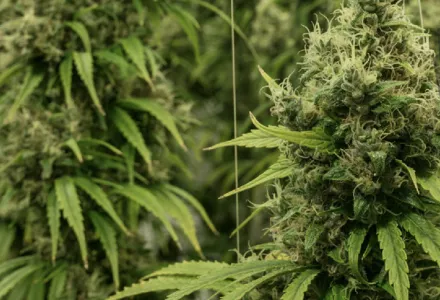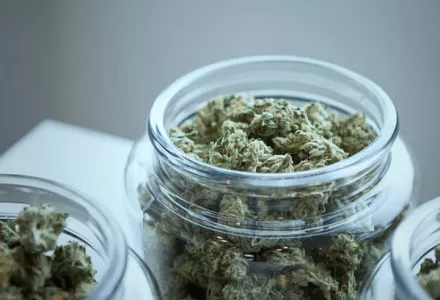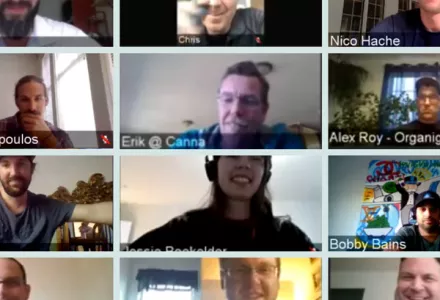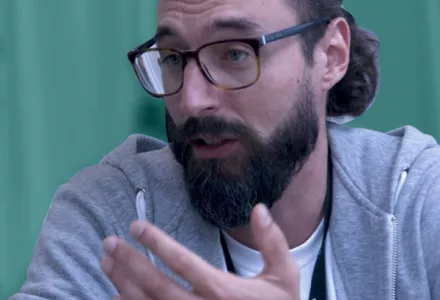NEWSFLASH
The key players in the Canadian Cannabis industry lack agreement on what their mission is. That is, if they’ve even given the idea of an industry mission any thought.
This blindness is frustrating the more forward-thinking Master Growers, who see the greater possibilities for their companies and the industry.
Most Licensed Producers don’t have a solid mission statement.
This was a key insight that emerged during discussions with 10 Master Growers at our second CANNAtalk experience in Vancouver on January 9, 2020.
Our panel of experts related three reasons why Licenced Producers mission statements are as elusive as a rare landrace strain:
- Because of the conflicting missions amongst the key stakeholders
- Because of the commodity-like market we are currently in
- Because of early career stage of Master Growers within the legal cannabis industry

Let’s look at these three reasons for a lack of mission within Canadian Licensed Producers in more detail:
1. Because of the conflicting missions amongst the key stakeholders
While Master Growers are central to the success of Licensed Producers in Canada, they are not the only stakeholder involved. Each key stakeholder has different missions, some that conflict with each other.
Here are their 4 different missions (for now):
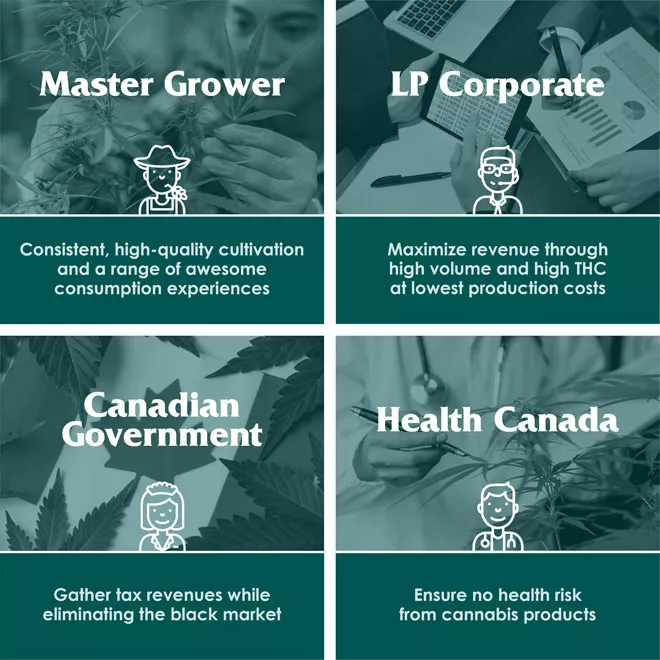
While Licensed Producers’ CEOs have to make the shareholders happy and compliant, the Master Growers care mostly about the plant quality and the consumer needs. When Health Canada Control manufacturing with conformity and standardization compliance, the government's primary concern is to collect taxes.
So, there is no common mission. Instead, there are four missions, and the Master Growers are being pressured to divert from what they believe is the right course.
2. Because of the commodity-like market we are currently in
We are in the early days of the legal cannabis market in Canada. Right now, in 2020 it’s a very immature market. Consumers are persuaded only by high THC content, which is really disappointing because there is much more to cannabis than that. So, for now, the head grower’ job is often limited to making sure they produce as much volume as possible of cannabis with high THC content.
“You want to do your best as a grower, to put your passion into a product. But the market is deciding what product succeeds. So if I find something that is 16% THC and it tastes wonderful, that looks beautiful, that’s very floral and I think someone wouldBobby Bains, Master Grower at Delta 9 Bio Tech
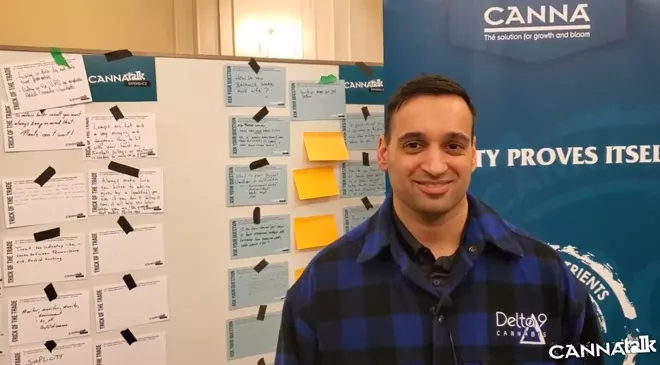
Unfortunately, some companies design their mission statement with retail and sales in mind. But again, can you blame them? In many ways, financing is what motivates companies in the cannabis industry. If you don't serve the market, you don't sell products. If you don't sell products, you don't make money. And if you don't make money, how do you make a living?
We’ll assume at some point the market will mature and people will say okay there is a lot more in Cannabis than just THC, like terpene, extract, taste, nose, and more. As consumers become more informed, they will start choosing more based on their overall experience, not just the lowest price and the power of the THC high.
We can eventually expect to break out from cannabis being a commodity to more-differentiated product, based on high quality and a variety of experiences. It’s harder to build a following for a brand without advertising being allowed in Canada, but not impossible. Consumers are already finding recommendations online via social media, cannabis reviewers, and sites like leafy.com. Consumers are trying and finding strains and brands they prefer. This will give more influence back to the Master Growers.
3. Because of early career stage of Master Growers within the legal cannabis industry
Master Growers are in a unique position. Most honed their skills growing cannabis during the illegal phase of market. Now they have been brought into the light.
Their influence within their companies is growing as their teams and outputs grow. They are not just learning corporate management methods, but are also shaping them. Master Growers are bringing their fresh, community-based perspective into the sterile world of business and finance. They are gaining the confidence to increasingly push back on CEOs’ rush-to-the-bottom commodity perspective – and to push back on Health Canada, too.
“Given the taboo nature of Cannabis and the fact that Canada was the first G7 country to legalize it, I think the regulatory authorities are too much based on a pharmaceutical model and not an agri-food model. As a result, the safety, health and compliancWilliam Fournier, Head Grower at Verd elite (Emerald Health Therapeutics Inc).
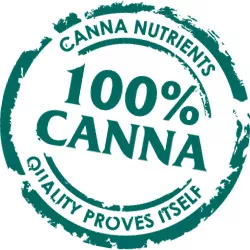
Master Growers can learn to assertively voice their interpretations of the Cannabis Act and work collaboratively with Health Canada to meet the goal of safe products, by highlighting the viability of their own high-quality Standard Operating Procedures.
Visionary Master Growers are thinking longer term about mission than all the other stakeholders. They recognize that a wide range of consistent, high-quality experiences will broaden the market and better serve consumers. That will allow Licensed Producers to gain even more market share away from the black market. Which will produce more overall shareholder value, more tax revenues, and better experiences and health outcomes for the entirety of Canadian consumers.
How LP company size influences your mission today
So, what should your mission be? Here are three ideas, depending on your LP size:
- Large-scale producers, with 1 or 2 million square feet of production, should prioritize kilograms of output per year. You have the economies of scale to do that.
- Micro-cultivators limited to 2,152 square feet of canopy will never be able to compete with the 1 million square foot producers in term of capacity, cost per gram, and commercialization. So why focus on that? It’s a battle you can’t win. Instead, focus on quality.
- A mission statement is trickier for companies with 100,000 square feet that fall in the middle. They have to focus on commercial but also quality. Because you can compete with the quality of a micro-cultivator and you can compete with the commercialization process of a million square feet.
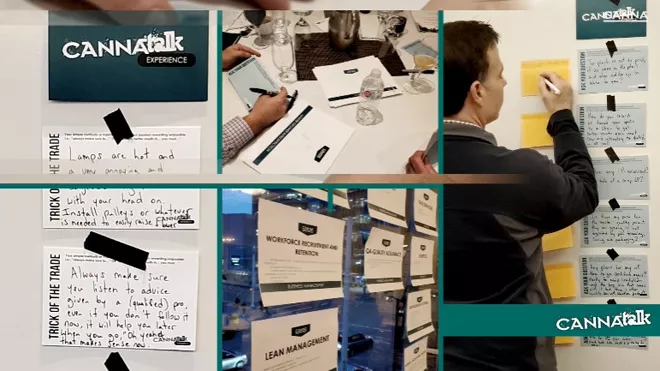
This discussion about mission was just one of the interesting topics Master Growers shared at our 2nd CANNAtalk experience.
Look for more great insights and ideas from your community of head growers at our 3rd CANNAtalk experience, THE PASSIONATE GROWER’S HUB, an exclusive space for Passionate Growers to connect, share, collaborate and explore specific cultivation related topics of interest. Don't miss the opportunity to participate in a unique, fun and engaging virtual experience on May 27th and June 4 inclusively.
